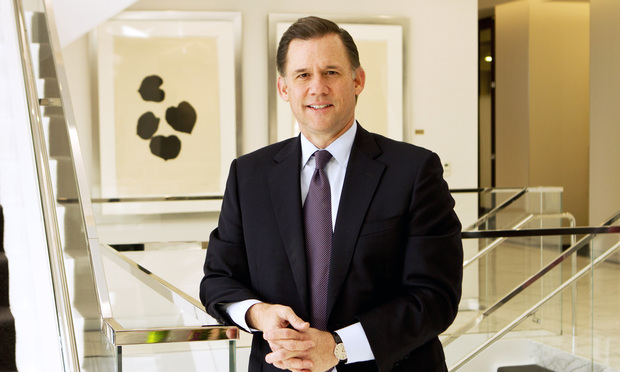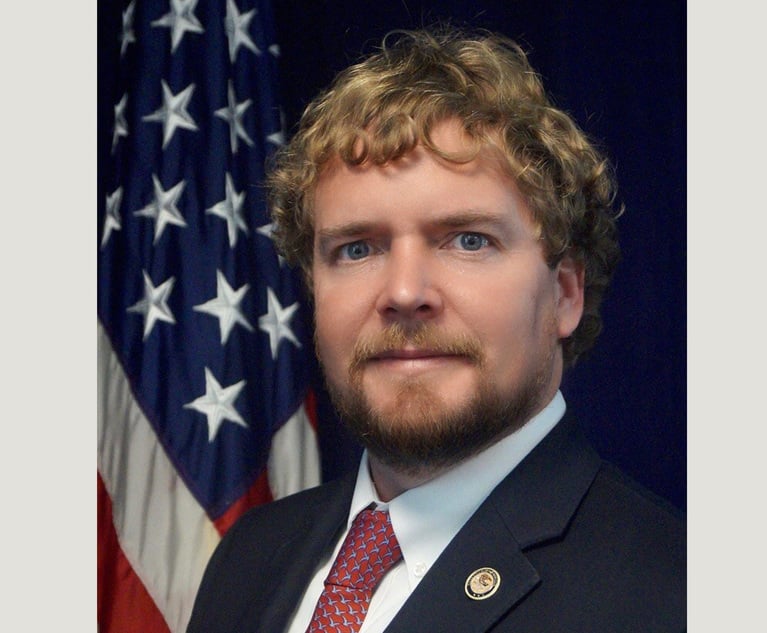Alston Boosts Partner Profits as Revenue Per Lawyer Exceeds $1M
Litigation work was up across the board, said Alston's chairman, Richard Hays, and demand increased for significant transactional work in several key, high-value practices.
March 02, 2020 at 03:59 PM
6 minute read
 Richard Hays, with Alston & Bird, in Atlanta. (Photo: John Disney/ALM)
Richard Hays, with Alston & Bird, in Atlanta. (Photo: John Disney/ALM)
Alston & Bird significantly boosted profits and revenue per lawyer last year, while revenue increased at a more moderate rate.
Alston's chairman, Richard Hays, said the firm exceeded budget. Litigation work was up across the board, he said, and demand increased for significant transactional work in several key, high-value practices, including M&A, banking, finance and private equity.
Health care, payments systems, data security and intellectual property were also busy areas, he said.
The Atlanta-based firm's net income jumped 8.7% to $343.32 million. That pushed up profits per equity partner by 7.9% to $2,251,000, as equity partner head count remained flat (up by a net of two for 153 equity partners). Alston broke the $2 million mark for PEP in 2018.
Relatedly, the firm's profit margin has increased over the past two years from 38% to 41% of revenue.
Revenue increased last year by 2.9% to $835.87 million, which boosted revenue per lawyer over the $1 million mark to $1,050,000—a 5.6% increase. That was coupled with a slight decline in head count, which dipped 2.6% to 796 lawyers.
 Hays said he was pleased with the productivity increase, as reflected in RPL. "We devoted a lot of attention to matter management, including efficient staffing," he said, which was "part of an intense focus on getting closer to clients and finding out what their pain points are."
Hays said he was pleased with the productivity increase, as reflected in RPL. "We devoted a lot of attention to matter management, including efficient staffing," he said, which was "part of an intense focus on getting closer to clients and finding out what their pain points are."
Alston's 2.9% revenue growth last year was at a slower rate than its 3.9% revenue growth in 2018–but the firm's 8.7% increase in net income outpaced its 7% profit growth in 2018.
Over the past decade, since the aftermath of the financial crisis, Alston has increased its net income and its PEP by almost 150% (net income increased from $138.35 million to $343.32 million in 2009, and PEP rose from $910,000 to $2,251,000).
Since 2009, Alston's revenue has increased by 52%, from $551.2 million in 2009 to $835.87 million last year.
The firm ended 2019 with no debt, Hays said, adding that technology continued to be a big expense as the firm invests in data analytics and other tools to help attorneys manage matters more efficiently.
Alston formed a unique, broad-based partnership last year with Georgia State University's 2.5-year-old Legal Analytics Lab to develop artificial intelligence programs for the firm from the ground up. The goal is to help Alston's lawyers and staff better understand existing software applications for legal data and develop new ones that serve firm and client needs—such as managing cases more efficiently and achieving better case results.
On the expense side, Alston opened a seven-lawyer London office in September focused on finance, payments systems and competition (antitrust) law. Post-Brexit, the firm is seeing more demand for its payments systems and antitrust practices, Hays said, "because people are trying to figure out regulatory environments."
The London office—the firm's 12th—connects with its payments practice in its Brussels outpost, led by Rich Willis. The firm opened that office in 2011 to extend its marquee payments practice, which originated in Atlanta—a global payments hub—to Europe.
Hays said Alston has "always been cautious about opening new offices, but we've also always said we'll be where our clients need us to be—and we see opportunities for growth in these areas that we are committed to."
The Talent
While Alston added a net of two equity partners in 2019, it reported a 1.6% decline in total partner head count, for 363 partners. Lateral recruitment and internal promotions continued apace, Hays said, but an unusually high number of retirements flattened partner head count.
The firm added 14 lateral partners last year and promoted another 16 lawyers to partner, but Hays said 16 partners retired in 2019, which is about three times the usual rate. "That's not in the pipeline for the coming year," he said.
Alston grew head count materially in key practices for the firm, Hays added, such as banking and finance, payments systems and health care.
In London, Alston recruited partners Andrew Petersen and James Spencer, who have a structured finance practice, plus two associates from K&L Gates, where Petersen headed that firm's London finance practice.
Alston hired another partner, James Ashe-Taylor, with a competition and payments system practice, and two associates from Constantine Cannon, where Ashe-Taylor headed that firm's European antitrust practice. Ashe-Taylor formerly headed Gibson Dunn's London and Brussels offices.
On the international front, the firm also hired a data privacy partner in Brussels, Wim Nauwelaerts from Sidley Austin.
Alston continued to invest in its West Coast offices. The firm added environmental litigation partner Greg Christianson from Morgan Lewis to its three-year-old San Francisco office in June, and then in January antitrust litigator Stuart Plunkett, president of the San Francisco Bar Association, from Baker Botts. In Los Angeles, the firm added corporate partner Scott Adamson, who'd headed Vedder Price's Los Angeles office, and IP litigator Yuri Mikulka from Manatt, Phelps & Phillips.
In Washington, Alston added five new partners last year, including Kathleen Benway, a former chief of staff for the Federal Trade Commission's Consumer Protection Bureau, from Wilkinson Barker Knauer.
The firm added white-collar litigation partner Tery Gonsalves to its Atlanta headquarters last year and then another white-collar litigator, Joey Burby, from Bryan Cave in February.
Among departures, in Alston's Atlanta headquarters it lost a trio of product liability defense litigators who started an Atlanta office for Shook Hardy & Bacon in June: Colin Kelly, Josh Becker and Anna Sumner Pieschel.
The Work
Alston ranked No. 19 on Mergermarket's 2019 list of law firms advising on U.S. M&A deals, with 82 deals valued at $182.1 billion. The firm advised longtime client FleetCor Technologies in its acquisition of Nvoicepay, which supplies accounts-payable technology, for an undisclosed price after handling earlier acquisitions for FleetCor including its 2017 acquisition of CambridgeGlobal Payments for $690 million.
It also advised Mobius Imaging and subsidiary Cardan Robotics in their $500 million acquisition by medical device company Stryker.
Alston acted as counsel to Credit Suisse, Citi and other investment banks on 23 transactions with an aggregate value of $153 billion—including as counsel to Credit Suisse on its representation of payments processor Worldpay in its $43 billion acquisition by fintech firm Fidelity National Information Services—one of the largest-ever fintech and payments deals.
Alston advised lenders or a number of major loan deals, ranking as No. 9 as underwriter counsel for 19 offerings worth $4.6 billion and No. 13 as issuer counsel with nine offerings valued at $2 billion, according to Asset-Backed Alert.
This content has been archived. It is available through our partners, LexisNexis® and Bloomberg Law.
To view this content, please continue to their sites.
Not a Lexis Subscriber?
Subscribe Now
Not a Bloomberg Law Subscriber?
Subscribe Now
NOT FOR REPRINT
© 2025 ALM Global, LLC, All Rights Reserved. Request academic re-use from www.copyright.com. All other uses, submit a request to [email protected]. For more information visit Asset & Logo Licensing.
You Might Like
View All

Sunbelt Law Firms Experienced More Moderate Growth Last Year, Alongside Some Job Cuts and Less Merger Interest
4 minute read
12-Partner Team 'Surprises' Atlanta Firm’s Leaders With Exit to Launch New Reed Smith Office
4 minute readLaw Firms Mentioned
Trending Stories
Who Got The Work
J. Brugh Lower of Gibbons has entered an appearance for industrial equipment supplier Devco Corporation in a pending trademark infringement lawsuit. The suit, accusing the defendant of selling knock-off Graco products, was filed Dec. 18 in New Jersey District Court by Rivkin Radler on behalf of Graco Inc. and Graco Minnesota. The case, assigned to U.S. District Judge Zahid N. Quraishi, is 3:24-cv-11294, Graco Inc. et al v. Devco Corporation.
Who Got The Work
Rebecca Maller-Stein and Kent A. Yalowitz of Arnold & Porter Kaye Scholer have entered their appearances for Hanaco Venture Capital and its executives, Lior Prosor and David Frankel, in a pending securities lawsuit. The action, filed on Dec. 24 in New York Southern District Court by Zell, Aron & Co. on behalf of Goldeneye Advisors, accuses the defendants of negligently and fraudulently managing the plaintiff's $1 million investment. The case, assigned to U.S. District Judge Vernon S. Broderick, is 1:24-cv-09918, Goldeneye Advisors, LLC v. Hanaco Venture Capital, Ltd. et al.
Who Got The Work
Attorneys from A&O Shearman has stepped in as defense counsel for Toronto-Dominion Bank and other defendants in a pending securities class action. The suit, filed Dec. 11 in New York Southern District Court by Bleichmar Fonti & Auld, accuses the defendants of concealing the bank's 'pervasive' deficiencies in regards to its compliance with the Bank Secrecy Act and the quality of its anti-money laundering controls. The case, assigned to U.S. District Judge Arun Subramanian, is 1:24-cv-09445, Gonzalez v. The Toronto-Dominion Bank et al.
Who Got The Work
Crown Castle International, a Pennsylvania company providing shared communications infrastructure, has turned to Luke D. Wolf of Gordon Rees Scully Mansukhani to fend off a pending breach-of-contract lawsuit. The court action, filed Nov. 25 in Michigan Eastern District Court by Hooper Hathaway PC on behalf of The Town Residences LLC, accuses Crown Castle of failing to transfer approximately $30,000 in utility payments from T-Mobile in breach of a roof-top lease and assignment agreement. The case, assigned to U.S. District Judge Susan K. Declercq, is 2:24-cv-13131, The Town Residences LLC v. T-Mobile US, Inc. et al.
Who Got The Work
Wilfred P. Coronato and Daniel M. Schwartz of McCarter & English have stepped in as defense counsel to Electrolux Home Products Inc. in a pending product liability lawsuit. The court action, filed Nov. 26 in New York Eastern District Court by Poulos Lopiccolo PC and Nagel Rice LLP on behalf of David Stern, alleges that the defendant's refrigerators’ drawers and shelving repeatedly break and fall apart within months after purchase. The case, assigned to U.S. District Judge Joan M. Azrack, is 2:24-cv-08204, Stern v. Electrolux Home Products, Inc.
Featured Firms
Law Offices of Gary Martin Hays & Associates, P.C.
(470) 294-1674
Law Offices of Mark E. Salomone
(857) 444-6468
Smith & Hassler
(713) 739-1250







